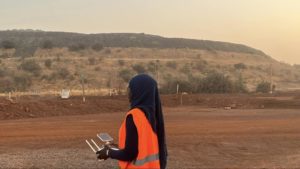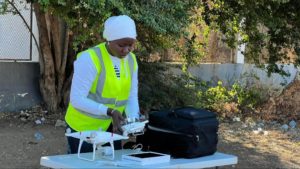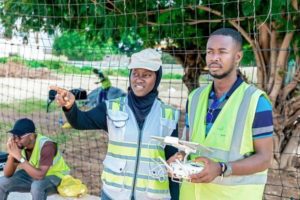
Senegal Flying Labs Brings Drone Training to Local Communities in Western Africa
Senegal Drone Academy's vision is to provide communities with equitable access to quality training and certification for the drone and data professions.
March 14th, 2024
In just a few years, Senegal Flying Labs, through its training arm, the Senegal Drone Academy, has emerged as a pivotal force in building the capacity of African drone pilots. The academy has established a strong reputation, thanks to unwavering support from partners like WeRobotics and Global Drone Training of the UK.
We have embarked on a transformative journey to empower African drone pilots. This initiative is driven by our vision to provide our communities with inclusive and equitable access to quality training and certification for the drone and data professions, aligning with the Sustainable Development Goals (SDGs). Our mission is clear: to train the best, most skilled, and professional drone and data operators in Africa.

The idea of bringing training closer to our local communities stems from a deep-seated commitment to inclusivity and accessibility. Recognizing the challenges faced by many aspiring drone operators in accessing quality training, we sought to bridge this gap by decentralizing our training programs. By taking our training to local communities, we not only make it more accessible but also empower individuals who may not have had the opportunity otherwise.
This collaboration, coupled with support from numerous Civil Aviation Authorities across the continent – including Senegal's ANACIM, Mali's ANAC-Mali, Côte d'Ivoire's ANAC-CI, Benin's ANAC Benin, Togo's ANAC-Togo, and Gambia's Gambia Civil Aviation Authority – has enabled the academy to train and support over 300 drone remote pilots. These pilots have been trained using UK A2 Certificate of Competency (A2 C of C) and General Visual Line of Sight Certificate (GVC) courses, aligning with our objective of bringing quality education and training closer to our communities while supporting local authorities in formulating rules and regulations.
This approach is not just about training individuals; it is about creating a sustainable impact. By training local communities, we are equipping them with the skills and knowledge needed to participate in the rapidly growing drone and data industry. This benefits the individuals themselves and also contributes to the economic development of their communities and the continent as a whole.
Over the past seven years, in collaboration with local and international partners, the Senegal Drone Academy has not only provided remote pilot certification training but also application-related training. This has equipped our community to participate in the rapidly growing drone and data industry.
Our partnership with WeRobotics and Global Drone Training of the UK has been instrumental in supporting this initiative. Their expertise and resources have helped us design and implement high-quality training programs that meet international standards. Additionally, the support of Civil Aviation Authorities across Africa has been crucial in ensuring that our training programs comply with regulatory requirements.
Our impact extends to university students and departments, international and national NGOs, funding agencies, telecoms, oil and gas companies, mining companies, and private and public institutions. We have provided them with a solid understanding of UAS general knowledge, principles of flight, rules of the air, and operational procedures. Additionally, we have trained them to analyze human performance factors affecting UAS operations, interpret meteorological conditions affecting UAS flights, and demonstrate proficiency in flight preparation, UAS preparation, and normal procedures.
 Our courses have also explored the applications of drones in surveying, renewable energies, conservation, mining, topography, town planning, agriculture, and telecommunications. Lastly, we have taught our candidates and students how to apply data analysis and photogrammetry techniques to process drone-collected data.
Our courses have also explored the applications of drones in surveying, renewable energies, conservation, mining, topography, town planning, agriculture, and telecommunications. Lastly, we have taught our candidates and students how to apply data analysis and photogrammetry techniques to process drone-collected data.
Our journey would not have been possible without the unwavering support and guidance of our partners, our dedicated local team, and the trust of our local Civil Aviation Authorities. Together, we are shaping the future of drone technology in Africa and empowering our communities to thrive in the digital age.
Category(s)
Recent Articles
View All »

Team Cameroon's Road to Victory at the First Global Robotics Competition 2025
